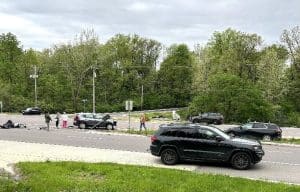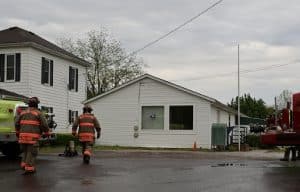Splash pad plans get ‘skinny’
The proposed splash pad at Zimmer Park seems to be getting some slight downsizing following last week’s Waterloo Park District meeting.
The project was recently revealed to have a total cost of $1.8 million, a sharp increase from the projected $800,000 discussed when plans for the project first began in 2019.
The Waterloo Park Board has since sought funding from various sources including the City of Waterloo’s video gambling fund and the William Zimmer Foundation.
The park board meeting last Wednesday night opened with discussion of the splash pad, with Waterloo Park Board President Shelby Mathes saying he had reached out to engineering firm HMG Inc. about revising its splash pad design for the “skinny of the skinny.”
Mathes noted that adjustments cannot currently be made to the primary architecture of the splash pad itself, thus the primary cut at this time appears to be removal of a large parking lot planned for the splash pad.
Mathes explained that in order to keep the $200,000 already received from a state grant as well as an additional $200,000 from the same grant for this project, the splash pad needs to be spraying water and have at least one handicap parking spot available by the June 2023 deadline.
The park district had previously expressed interest in the possibility of extending this grant, though Mathes and park board member Michael Nolte, who had been the primary member of the board pursuing this extension, said it wasn’t likely to be granted.
“We asked for an extension,” Mathes said. “It doesn’t sound like we’re gonna get it. We’re still working with a couple people trying to get that to see if they’ll give us even a six month extension.”
Nolte did express that the deadline in June might be somewhat flexible even if the park board is unable to secure a year or half-year extension.
Splash pad discussion also involved the possibility of adjusting certain features of the project – such as replacing a central barn structure with a similar bucket pouring structure – though no such changes were specifically decided.
The board did ultimately decide to request revisions be made to the designs by HMG, with costs to modify these designs not to exceed $10,000.
Toward the end of the meeting, Waterloo Alderman Jim Trantham voiced his concern about the recommended parking lot change.
Mathes had previously said those visiting the splash pad would be able to park in the lot intended for the nearby pavilions, but Trantham noted that people will be far more likely to park closer to the actual splash pad.
“I know that’s what you’d like, but I’ll tell you what’s gonna happen. You have no control of it,” Trantham said. “They’re gonna park on Benjamin (Lane) … They’re not going to park down there and walk up.”
Trantham, a former Waterloo police chief, cited his previous experience with the police having to arrest folks jumping the curb and parking in the grass at the old Waterloo High School during football games.
Mathes said the park board is currently simply unable to plan for a large parking lot from the start and thus some no parking signs might have to be put up.
In this discussion toward the end of the meeting, Mathes expressed frustration with the perceived lack of community support for the splash pad project.
Park board member Gina Pfund refuted this idea.
“I don’t think we should say the community’s not supporting our efforts,” Pfund said. “There are some people that have said they’ve wanted to support it, so I don’t think we can come out and say that.”
Pfund later said she was referring to Waterloo Citizens for a Pool, who had expressed willingness to assist the park district in securing $400,000 in the form of a donation from the Zimmer Foundation toward this project.
The Zimmer Foundation had previously expressed a willingness to donate to the park district for this project but later found it would be unable to donate directly to a taxing body.
The possibility of a pass-through of the donation through WCP – a licensed 501(c)(3) organization – was discussed at several previous park board meetings, though discussions between the three organizations never took place and the legality of such an exchange is still unclear.
Also at the park board meeting, Pfund expressed an interest in adjusting policy to allow board members to participate in meetings over the phone should they be unable to attend in-person.
Board members attending in this manner wouldn’t count toward a quorum for the meeting, but they would still be able to participate, she said.
The idea received pushback from Mathes and Waterloo Park District Attorney Mary Buettner, who said such policy might not be allowed in the future.
Pfund noted that should the law pertaining to remote participation change, the park board could adjust its policy as well.
Waterloo Alderman Stan Darter expressed that the city has allowed for such participation for committee meetings for some time, though such participation for city council meetings has not occurred.






